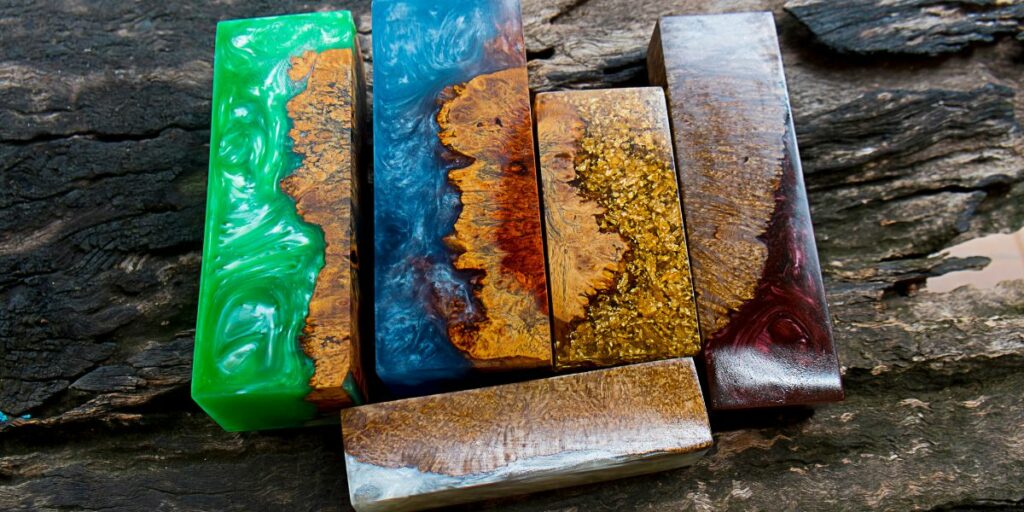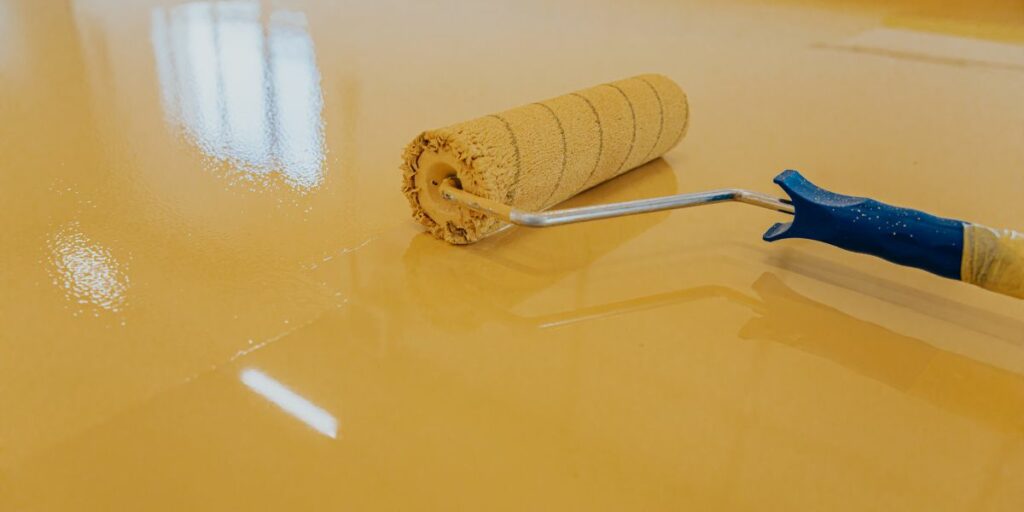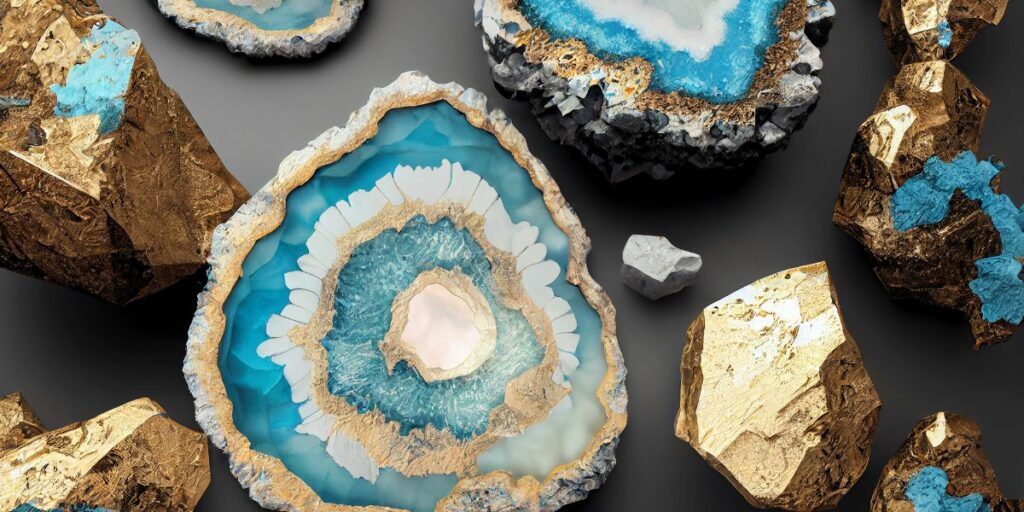Epoxy resin is a widely used and popular material in various industries, like construction, automotive, woodworking, and crafting, etc. Its versatility and durability make it a sought-after material for various applications. But right now in the market, there are so many options available, which makes choosing the right type of epoxy resin a challenge.

We have experience in epoxy resin. So, in this article, we prepared a list of key factors for you to consider when selecting an epoxy resin for your project.
Consider Hardness
When choosing an epoxy resin, consider the hardness of the final cured product. The hardness of epoxy resin can vary greatly depending on the type of epoxy resin being used and the curing process.
Generally, epoxy resins can range from very soft to extremely hard.
If you want epoxy resin for your floor coating, hard epoxy will be a better choice because it will be more durable and resistent to wear and tear. But, if you are using epoxy resin for a DIY craft project, a softer epoxy may be your better selection because it will be more flexible and less likely to crack.
Look for Viscosity, i.e. Thickness of Epoxy
Viscosity refers to the thickness or thinness of a liquid. It is another key factor you should keep in mind when choosing an epoxy resin for your project.
Epoxy resins can vary greatly in viscosity, from thin and runny to thick and sticky.
The viscosity of epoxy resin can affect the ease of your project, the final appearance of the cured product, and the curing time as well.
Thicker epoxy resins are generallly easier to work with, but they usually take longer to cure. On the other hand, thinner resins may be more difficult to apply evenly, but they cure faster.
Check its Curing time
Curing time is the time epoxy resin takes to become fully cured. I.e. Fully ready product to the point at which it offers full mechanical, chemical- and thermal load resistance.
The curing time of an epoxy resin is important to consider. Some resins can cure in as little as 24 hours, while others can take 7+ days.
The curing time depends on a number of factors, including the type of resin, the temperature, and the humidity.
Usually, increasing temperature reduces the curing time to 1/4 for some types of epoxies.
If you are working on a time-sensitive project, you may want to choose a resin that cures faster OR at least the set time is lower to the point that you need.
It’s important to keep in mind that a faster curing time may also mean that the resin is less flexible and more brittle.
There is also a Set Time, which refers to the time epoxy resin takes to become viable. It is different than curing time, and usually less than it.
Don’t forget to consider the Cost

It’s the most basic thing to consider when choosing almost any product, as it’s always an important factor to consider, and choosing an epoxy resin is not exceptional. Epoxy resins can vary greatly in price. In the market, some are much more expensive than others.
So, it’s important to choose a resin that fits your budget but also meets your needs in terms of other factors, like hardness, viscosity, UV resistance, and curing time, etc.
Material and surface compatibility
When choosing an epoxy resin, it’s crucial to consider the type of material and surface you’ll be working with. Because different types of epoxy resin have varying levels of compatibility with different materials and surfaces.
Some epoxy resins will work flawlessly with wood, but may not work with metallic surfaces or plastics. You may also need to consider the toxicity of your selected epoxy resin if you are going to use it for food containers.
It’s essential to choose a resin that is compatible with your project material, or the final result may not meet your expectations.
Depth and Thickness
Another key factor to consider when choosing an epoxy resin is the depth and thickness required for your project. Because some resins are formulated for shallow pours, while others are made specifically for deep pours.
If you’ll be using epoxy for your floor, a shallow pour resin will be better. But if you are going to make some jewelry out of it, a deep pour epoxy resin will be what you need. A deep-pour epoxy is specially formulated for molding these small projects.
You should choose a resin that is suitable for the depth and thickness required for your project to ensure that it will harden correctly and create a solid and durable product.
Odor, Fumes, and Toxicity
When working with epoxy resin, it’s important to consider the odor, fumes, and toxicity of the resin. Because some resins produce strong fumes or have a potent odor, which makes them challenging to work with in enclosed spaces with poor ventilation.
Some resins can also be toxic and can cause skin irritation or other health problems.
It’s crucial to choose a resin that is safe and easy to work with, especially if you’ll be using it in your home or office environment.
Durability is Important for any Product
The durability of epoxy resin is an essential factor to consider when selecting epoxy resin for your project. Different types of resin have different durability levels, and it’s crucial to choose a resin that is suitable for your specific project needs.
For example, if you need resin for a floor or countertop, you’ll want to choose a resin that is highly durable and able to withstand heavy use. Even for small projects, like jewelry or other DIY projects, you should still select a durable resin, which can last longer.
The durability of an Epoxy resin strongly depends on its resistance to different environmental factors. Below are the most common ones to consider.
Resistance to Environmental Factors

Resistance is a very important factor to consider when choosing an epoxy resin. A resin with good resistance properties can withstand the wear and tear of everyday use and maintain its appearance and functionality for years to come.
Resistance to environmental factors determines the durability of your epoxy projects.
Manufacturers can manipulate its formulae to make it more durable by making it resistant to abrasion, UV light, moisture, chemical, etc.
UV resistance
Ultraviolet (UV) light can cause yellowing and other discoloration in some resins. If you’ll be using your resin project outdoors or in an area with a lot of sunlight, it’s important to choose a resin that has good UV resistance to prevent discoloration, or damaging the smooth texture, and ensure the longevity of your project.
Abrasion resistance
Abrasion resistance is the ability of a material to resist wear and tear caused by friction. It makes a resin product hard to damage by abrasive materials like sponges, cutting boards, scouring pads, and even car tires too, if the resin shall be used to coat the garage floor.
So, if you’re using the resin for a floor or countertop, choose a resin with good abrasion resistance to prevent scratches and other damages from daily use.
Chemical resistance
Chemical resistance refers to a material’s ability to resist damage from chemicals and other substances. This property is important to consider if your intended use for the resin is in a laboratory-like setting.
For example, if you’ll be using the resin in an industrial or laboratory setting, you’ll want to choose a resin with good chemical resistance to prevent damage from corrosive substances.
Impact strength
Impact strength refers to a material’s ability to resist damage from impacts and other physical stress. Consider this factor, if you are going to use the resin for coating floors, or repairing items of furniture.
E.g. If you’re using the resin for a floor or countertop, choose a resin with good impact strength to prevent cracks and other damage from dropped objects.
The higher the impact strength, the more resistant your epoxy finished product will be to impact damage.
Moisture resistance
Moisture resistance refers to a material’s ability to resist damage from moisture and other liquids. This factor is particularly important if you intend to use the resin in bathrooms or ponds.
For example, if you’ll be using the resin in a bathroom or kitchen, choose a resin with good moisture resistance to prevent damage from water.
Heat resistance
Another factor to consider when choosing epoxy resin is its heat resistance. If you plan on using the epoxy resin in a high-heat environment/area, you should choose an epoxy resin that is heat-resistant. This will help ensure that the epoxy resin does not deform or crack under high temperatures.
Yellowing resistance
With time, some epoxy resins turn yellow or discolor if exposed to sunlight and other environmental factors. This can be a major issue for some projects that are visible and exposed to direct sunlight, such as garage floors.
To ensure that your project retains its original appearance, you should choose an epoxy resin that is formulated with yellowing resistance.
Additional Features
In addition to these essential factors, there are also a number of additional features to consider when choosing epoxy resin. Some of these features include:
- Self-leveling formulas: Some epoxy resins are formulated to self-level, making them ideal for projects that require a smooth, even finish. This can save you time and effort when it comes to achieving the perfect finish on your project.
- Bubble-release formulas: Some epoxy resins are formulated with bubble-release formulas, which help to minimize the formation of bubbles during the curing process. This can be especially important for projects that require a smooth, bubble-free surface.
Conclusion
When choosing an epoxy resin for any type of project, you should consider several factors. From hardness and viscosity to environmental factors’ resistance and curing time, it’s important to choose a resin that meets your specific needs.
Remember to also consider the cost of the resin, as epoxy resins can vary greatly in price.
By taking the time to evaluate each of these factors, you can choose the right epoxy resin for your project and ensure its success.
FAQs
Ready to take your project to the next level? Let’s dive into the world of epoxy resin selection like a pro and revolutionize the way you work. Comment and share your epoxy resin journey with us!
I just wanted to take a moment to say how much I appreciate your blog posts. They’re always well-written, informative, and keep me coming back for more. Keep up the great work!
This is exactly what I needed to read today Your words have provided me with much-needed reassurance and comfort